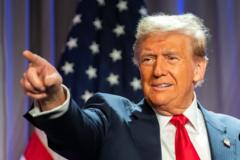In a bold declaration on social media, President-elect Donald Trump has warned of imposing 100% tariffs on BRICS nations if they advance efforts towards establishing a currency to rival the US dollar. The BRICS alliance comprises major emerging economies: Brazil, Russia, India, China, South Africa, along with Iran, Egypt, Ethiopia, and the UAE. Trump's announcement, made on Saturday, reflects his aggressive stance on trade and his historical commitment to using tariffs as leverage.
Throughout the election campaign, Trump had advocated for significant tariff implementations, and his latest ultimatum emphasizes a zero-tolerance policy regarding any shift away from dollar dependence. "The idea that the BRICS Countries are trying to move away from the Dollar while we stand by and watch is OVER," he proclaimed, indicating that potential moves by these nations could invoke severe financial penalties.
Leaders within the BRICS bloc have broached the subject of forming a new currency to dilute the dollar's dominance in global trade, but internal rifts have hindered meaningful advancements. Trump further articulated that if these nations proceeded with attempts at creating a currency or supporting alternatives, they could expect to "say goodbye to selling into the wonderful US economy." He added the provocative note that they could "go find another sucker."
Some political analysts and Trump supporters interpret his dramatic tariff threats as part of a broader negotiation strategy rather than outright promises aimed solely at punitive measures. Senator Ted Cruz echoed this sentiment when he remarked on CBS, highlighting the effectiveness of leveraging tariffs as a negotiation tool, referring to the recent diplomatic engagement with Canada to avert a possible tariff hike.
In previous statements, Trump's chosen Treasury Secretary, Scott Bessent, suggested that these threats reflect an approach of escalating tension to ultimately reach de-escalation—a tactic aimed at enhancing leverage in trade talks. Trump's historical use of tariffs as a method for stimulating the US economy and safeguarding domestic jobs reiterates his long-standing economic strategy despite critiques about their resultant impact on consumers.
While tariffs represent a significant element of Trump's economic agenda—portrayed as a means to grow the economy—most economists assert that the burden tends to fall on US consumers rather than just foreign exporters. Trump’s term features several tariffs that have endured beyond his administration, affecting trade relations with nations, particularly Canada and Mexico, where negotiations are ongoing.
As the world observes these developments, the dialogue surrounding BRICS and the dollar showcases the complexities of international trade relations in an increasingly multipolar economic landscape, highlighting the potential geopolitical ramifications of currency rivalry.


















